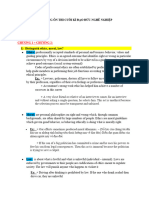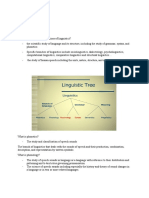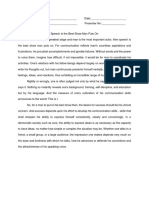0 ratings0% found this document useful (0 votes)
6 viewsEthical Code
Ethical Code
Uploaded by
maxwellmbalako37Copyright:
© All Rights Reserved
Available Formats
Download as DOCX, PDF, TXT or read online from Scribd
Ethical Code
Ethical Code
Uploaded by
maxwellmbalako370 ratings0% found this document useful (0 votes)
6 views5 pagesOriginal Title
ethical code
Copyright
© © All Rights Reserved
Available Formats
DOCX, PDF, TXT or read online from Scribd
Share this document
Did you find this document useful?
Is this content inappropriate?
Copyright:
© All Rights Reserved
Available Formats
Download as DOCX, PDF, TXT or read online from Scribd
Download as docx, pdf, or txt
0 ratings0% found this document useful (0 votes)
6 views5 pagesEthical Code
Ethical Code
Uploaded by
maxwellmbalako37Copyright:
© All Rights Reserved
Available Formats
Download as DOCX, PDF, TXT or read online from Scribd
Download as docx, pdf, or txt
You are on page 1of 5
ETHICAL CODE OF CONDUCT FOR ACCOUNTING PROFENSIONALS
An ethical code of conduct for accounting professionals outlines the
principles and standards that guide their behavior and interactions within
the accounting profession.
It ensures integrity, transparency, and accountability in financial
reporting, auditing, and other related activities. As accounting
professionals, we are committed to upholding the highest ethical
standards in all our actions and decisions.
Our conduct is guided by the following principles, which are essential for
maintaining the trust and confidence of clients, stakeholders, and the
public. Below are some key principles and guidelines that accounting
professionals should adhere to:
1. Integrity: We shall conduct ourselves with honesty, truthfulness, and
professionalism in all our interactions. We will not engage in deceptive,
fraudulent, or unethical practices.
2. Objectivity: We will provide objective and neutral (unbiased) analysis,
opinions, and recommendations. Our judgment will not be influenced by
personal bias, conflict of interest, or undue pressure.
3. Competence: We will strive for excellence by continuously improving our
knowledge, skills, and expertise. We will only provide services that we are
competent to perform.
4. Confidentiality: We will respect the confidentiality of sensitive
information entrusted to us by clients, employers, and colleagues. We will
not disclose or use confidential information for personal gain.
5. Professional Behavior: We will uphold professional behavior in all our
interactions. We will treat all individuals with respect, courtesy, and
fairness, regardless of their background or position.
6. Independence: We will maintain independence in thought and action.
We will avoid situations that could compromise our objectivity or lead to
conflicts of interest.
7. Transparency: We will provide accurate and transparent financial
information. We will clearly communicate the methods, assumptions, and
limitations underlying our work.
8. Compliance: We will comply with all applicable laws, regulations, and
professional standards. We will promptly report any violations or potential
breaches of ethical standards.
9. Avoidance of Harm: We will consider the potential impact of our actions
on clients, stakeholders, and the public. We will avoid actions that could
harm the reputation or financial well-being of others.
10. Continual Improvement: We will continuously strive to enhance our
ethical awareness and ethical decision-making skills. We will seek
opportunities for professional development and ethical education.
11. Responsibility to Society: We recognize our responsibility to
contribute positively to society. We will consider the broader social
implications of our work and promote ethical behavior within the
profession.
Violation of this code of conduct may result in disciplinary action, including
the revocation of professional certifications and legal consequences. By
adhering to this ethical code of conduct, we affirm our commitment to
maintaining the highest standards of ethics and professionalism in the
practice of accounting.
It's important to note that different organizations and professional bodies
may have their own specific ethical codes of conduct tailored to their
industry and context. The above example serves as a general guideline and
can be customized as needed to align with the specific values and principles
of a particular accounting profession or organization.
IMPORTANCE OF ETHICAL CODE OF CONDUCT FOR ACCOUNTING
PROFESSIONALS
The ethical code of conduct for accounting professionals plays a crucial role
in maintaining the integrity and credibility of the accounting profession.
Here's why it's important:
1. Trust and Credibility: Ethical conduct builds trust between accounting
professionals, clients, stakeholders, and the public. This trust is essential
for the accuracy and reliability of financial information.
2. Protection of Public Interest: Accounting professionals have a
responsibility to protect the interests of the public by ensuring accurate
and transparent financial reporting. Ethical behavior helps prevent
misleading financial information that can harm investors, creditors, and
the general public.
3. Maintaining Professional Reputation: Upholding ethical standards
enhances the reputation of individual accountants and the accounting
profession as a whole. This reputation is crucial for attracting clients, job
opportunities, and partnerships.
4. Integrity of Financial Information: Ethical conduct ensures that
financial information is recorded, reported, and presented accurately,
reflecting the true financial position of an organization.
5. Compliance with Regulations: Ethical codes often align with legal and
regulatory requirements. Following these codes helps professionals avoid
legal troubles and maintain compliance with industry standards.
6. Quality Decision-Making: Ethical behavior guides accounting
professionals in making morally sound decisions, even in challenging
situations. This leads to decisions that prioritize the best interests of the
organization and its stakeholders.
7. Conflict Resolution: An ethical code of conduct provides a framework
for addressing conflicts of interest, ensuring that decisions are made
objectively and without personal bias.
8. Professional Development: Adhering to ethical standards encourages
continuous professional development. Accountants engage in ongoing
learning to stay updated on regulations, best practices, and ethical
guidelines.
9. Reduced Fraud and Misconduct: A strong ethical culture helps deter
fraudulent activities, reducing the risk of financial misconduct within
organizations.
10. Transparency: Ethical conduct promotes transparency in financial
reporting, making it easier for stakeholders to assess the financial health
of an organization.
11. Career Advancement: Organizations value ethical professionals who
uphold their reputation. Ethical accountants are more likely to advance in
their careers and take on leadership roles.
12. Social Responsibility: Ethical behavior is a manifestation of an
accountant's commitment to social responsibility. It contributes to a fair
and just business environment.
13. Global Consistency: Ethical codes provide a common framework for
accountants across the world. This promotes consistency in professional
behavior and expectations.
14. Minimized Risk: Organizations with ethical accounting practices are
less likely to face legal disputes, financial penalties, and damage to their
reputation.
15. Personal Satisfaction: Acting ethically brings personal satisfaction
and a sense of pride in one's profession. Knowing that one's work
contributes to accurate financial information and fair business practices is
rewarding.
In summary, the ethical code of conduct for accounting professionals ensures
honesty, integrity, and transparency in financial reporting, leading to a more
trustworthy and stable financial environment for organizations and society as
a whole.
You might also like
- Ragone Solution Manual From Nanyang UniversityDocument67 pagesRagone Solution Manual From Nanyang UniversityRijalCok71% (14)
- MIPS Question BookletDocument3 pagesMIPS Question BookletScribdTranslationsNo ratings yet
- Ethics in InsuranceDocument19 pagesEthics in InsuranceDruti Jaiswal80% (5)
- Gombrich Art and IllusionDocument5 pagesGombrich Art and IllusionMarshall Duke0% (1)
- Accounting Ethics PDFDocument6 pagesAccounting Ethics PDFSunday OcheNo ratings yet
- ABS-LECTURE 3 (Professional Ethics)Document32 pagesABS-LECTURE 3 (Professional Ethics)Lordwin ArcherNo ratings yet
- The Importance of Ethics in The Accounting ProfessionDocument9 pagesThe Importance of Ethics in The Accounting Professionpuc.pudsNo ratings yet
- PEPA GPTDocument19 pagesPEPA GPTsriNo ratings yet
- Code of Business EthicsDocument14 pagesCode of Business EthicsVicky KsNo ratings yet
- Overview of Professional EthicsDocument8 pagesOverview of Professional EthicsemmillianomNo ratings yet
- Business ProtocolDocument13 pagesBusiness Protocolsuvarnachaitra27No ratings yet
- Auditing 1 L2 Professional EthicsDocument32 pagesAuditing 1 L2 Professional EthicsvictoriaNo ratings yet
- Chapter 1 ethicsDocument5 pagesChapter 1 ethicsSwechchha BhattaraiNo ratings yet
- ACFM Unit 5 Ethical and Governance IssuesDocument12 pagesACFM Unit 5 Ethical and Governance Issuesyashwanthkrupa150No ratings yet
- Ethics in Finance and AccountingDocument4 pagesEthics in Finance and AccountingAkumjungla AierNo ratings yet
- Auditing and Corporate GovernanceDocument5 pagesAuditing and Corporate Governancesuraj agarwalNo ratings yet
- BE TestDocument15 pagesBE TestkrupithkNo ratings yet
- Ethics-OJT Task 2Document3 pagesEthics-OJT Task 2John Lexter MacalberNo ratings yet
- Pepa 1Document19 pagesPepa 1sriNo ratings yet
- Group 2 Auditing and Corporate GovernanceDocument18 pagesGroup 2 Auditing and Corporate GovernanceAmaan SaifiNo ratings yet
- 6.... The Importance Ethics For BusinessDocument2 pages6.... The Importance Ethics For Businessarafkhan1623No ratings yet
- ETHOSDocument17 pagesETHOSShubhangi SonkarNo ratings yet
- All India Essay Writing Competition I CsiDocument4 pagesAll India Essay Writing Competition I CsiboraseobsamNo ratings yet
- Ethics in Corporate Governance. AssignmentDocument11 pagesEthics in Corporate Governance. AssignmentheathvodkaNo ratings yet
- Notes1 Module1 BECG GCWDocument23 pagesNotes1 Module1 BECG GCWjayeshraj0000No ratings yet
- Professional EthicsDocument12 pagesProfessional EthicsFiona UsherNo ratings yet
- What Is Business EthicsDocument9 pagesWhat Is Business Ethicskashyappratham000No ratings yet
- Auditing Chapter2Document7 pagesAuditing Chapter2Getachew JoriyeNo ratings yet
- What Is Professional Ethics and Social Responsibility of ManagementDocument12 pagesWhat Is Professional Ethics and Social Responsibility of Managementsinhasoumya408No ratings yet
- Business Ethics and Human Values: Mba CP 107Document41 pagesBusiness Ethics and Human Values: Mba CP 107farru84No ratings yet
- Bachelor Dissertation SummaryDocument2 pagesBachelor Dissertation SummaryGerdaNo ratings yet
- Chapter 5Document11 pagesChapter 5Swechchha BhattaraiNo ratings yet
- Concept of Business Unit 4Document11 pagesConcept of Business Unit 4Ram KrishnaNo ratings yet
- Đề Cương Ôn Thi Cuối Kì Đạo Đức Nghề NghiệpDocument21 pagesĐề Cương Ôn Thi Cuối Kì Đạo Đức Nghề NghiệpNam Nguyễn HoàngNo ratings yet
- CSR, Ethics and Corporate Governance - 2Document5 pagesCSR, Ethics and Corporate Governance - 2Bharat ToshniwalNo ratings yet
- PROF - DEV. AND APPLIED ETHICSweek7Document15 pagesPROF - DEV. AND APPLIED ETHICSweek7Cabreros, Edlyn-CARNo ratings yet
- Unit 3. Ethics and BusinessDocument10 pagesUnit 3. Ethics and Businessrasikasonawane31No ratings yet
- 6014 Assignment ATMscriptDocument2 pages6014 Assignment ATMscriptpatricianguyen1997No ratings yet
- Business EthicsDocument10 pagesBusiness EthicsRashmi Ranjan Panigrahi100% (1)
- Eds 102 - Module 5Document4 pagesEds 102 - Module 5faithojonimi335No ratings yet
- Handout 2 - Business Ethics and Social ResponsibilityDocument4 pagesHandout 2 - Business Ethics and Social ResponsibilityFJ AldeaNo ratings yet
- EthicsDocument7 pagesEthicsSniper_8No ratings yet
- 2_Part_2 - Dashboard - Principles and Standards of Professional EthicsDocument122 pages2_Part_2 - Dashboard - Principles and Standards of Professional EthicsKKNo ratings yet
- The Concept of EthicsDocument4 pagesThe Concept of EthicsJade Ballado-TanNo ratings yet
- The Ethical and Social Responsibilities of The EntrepreneurDocument10 pagesThe Ethical and Social Responsibilities of The EntrepreneurMark Jhon PausanosNo ratings yet
- Week 2 LaqDocument5 pagesWeek 2 Laqkiranoffice97No ratings yet
- Handout 2 - BUSINESS ETHICS AND SOCIAL RESPONSIBILITYDocument4 pagesHandout 2 - BUSINESS ETHICS AND SOCIAL RESPONSIBILITYLaila Mae PiloneoNo ratings yet
- Module 3 Exam Notes 2Document16 pagesModule 3 Exam Notes 2Pulak DixitNo ratings yet
- Ethic Audit 2 2023Document36 pagesEthic Audit 2 2023Agus HybanaNo ratings yet
- EntrepDocument2 pagesEntrepJELLY LULABNo ratings yet
- Business Ethics and Corporate GovernanceDocument6 pagesBusiness Ethics and Corporate Governanceankitmunda69No ratings yet
- Business Ethics and Society: Ques.1 (1) Compliance Orientation & Values OrientationDocument19 pagesBusiness Ethics and Society: Ques.1 (1) Compliance Orientation & Values OrientationVatsal ChangoiwalaNo ratings yet
- Ehical PespectivesDocument8 pagesEhical PespectivesMashel MichNo ratings yet
- PhiDocument2 pagesPhiarafkhan1623No ratings yet
- 002 Ift Highyield NotesDocument361 pages002 Ift Highyield NotesVaibhav KumarNo ratings yet
- R01 Ethics and Trust in The Investment Profession: Instructor's NoteDocument26 pagesR01 Ethics and Trust in The Investment Profession: Instructor's NoteMani ManandharNo ratings yet
- Business Ethics: Project Report OnDocument29 pagesBusiness Ethics: Project Report OnIshika ChoudharyNo ratings yet
- Unit 3 ETHICAL ISSUES IN FINANCIAL MANAGEMENT, IT & CYBER SPACEDocument39 pagesUnit 3 ETHICAL ISSUES IN FINANCIAL MANAGEMENT, IT & CYBER SPACEbhargav.bhut112007No ratings yet
- BT - Professional Ethics in Accounting and BusinessDocument10 pagesBT - Professional Ethics in Accounting and Businessrafiulbiz12No ratings yet
- Professional Ethics and Social ResponsibilitiyDocument22 pagesProfessional Ethics and Social Responsibilitiyhoneysgh.394No ratings yet
- Business Ethics: Fon Univerzitet Prv-Privaten-Univerzitet-Vo-R.M. Fakultet Za Primeneti Stranski Jazici I BiznisDocument15 pagesBusiness Ethics: Fon Univerzitet Prv-Privaten-Univerzitet-Vo-R.M. Fakultet Za Primeneti Stranski Jazici I BiznisTrajko GjorgjievskiNo ratings yet
- Ethical and Legal Issues in Business CommunicationDocument2 pagesEthical and Legal Issues in Business CommunicationClaira BanikNo ratings yet
- DK Essential Managers: Ethical Business: Sustainability, Commitment, Values, Transparency, EnvironmentFrom EverandDK Essential Managers: Ethical Business: Sustainability, Commitment, Values, Transparency, EnvironmentNo ratings yet
- CLASS VII Holiday HomeworkDocument4 pagesCLASS VII Holiday HomeworkArtiNo ratings yet
- 2x2 5 by Lewis CarollDocument1 page2x2 5 by Lewis CarolltauloverNo ratings yet
- Calculus Study GuideDocument3 pagesCalculus Study GuidedahjkdhsaNo ratings yet
- Course Description: MATHEMATICS in The MODERN WORLD First Semester SY 2021 - 2022Document70 pagesCourse Description: MATHEMATICS in The MODERN WORLD First Semester SY 2021 - 2022Kyla CelebreNo ratings yet
- Cosmic EnergyDocument3 pagesCosmic EnergyArnav BamoriaNo ratings yet
- What Is Antarctica Target Lesson STUDENT COPYDocument7 pagesWhat Is Antarctica Target Lesson STUDENT COPYKun XiangNo ratings yet
- BL2509 W-2020-099 - 6000x2500x20 - S355J2+N (FC20292401) 52252-1 - 2Document2 pagesBL2509 W-2020-099 - 6000x2500x20 - S355J2+N (FC20292401) 52252-1 - 2johnnyNo ratings yet
- одредување на ниво -лингва бинест (1) .doc возрасниDocument14 pagesодредување на ниво -лингва бинест (1) .doc возрасниBiljana NestorovskaNo ratings yet
- Peer-Review Checklist: Step 1: Pre-Read - Invitation To ReviewDocument1 pagePeer-Review Checklist: Step 1: Pre-Read - Invitation To ReviewCamilo García SarmientoNo ratings yet
- Unim Ae: Multi-Modal Masked Autoencoders With Unified 3D Representation For 3D Perception in Autonomous DrivingDocument12 pagesUnim Ae: Multi-Modal Masked Autoencoders With Unified 3D Representation For 3D Perception in Autonomous Drivinghp49312No ratings yet
- DLP New FormatDocument23 pagesDLP New FormatVej SevillenaNo ratings yet
- Advanced Mechanics of Solids 925cDocument425 pagesAdvanced Mechanics of Solids 925cHungryHowls ASMR100% (4)
- Personal Assignment 2 Week 3 Session 4: Do Exercises: Passage 1-4 in Listening Skill 3, Page 143-147. (Longman IBT Book)Document21 pagesPersonal Assignment 2 Week 3 Session 4: Do Exercises: Passage 1-4 in Listening Skill 3, Page 143-147. (Longman IBT Book)Hariyanto HariyantoNo ratings yet
- Experiments and Finite Element Modelling of Screw Pattern of Self-DrillingDocument18 pagesExperiments and Finite Element Modelling of Screw Pattern of Self-DrillingSang NguyenNo ratings yet
- Think Metacognition-Powered Primary Teaching (Anoara Mughal) (Z-Library)Document233 pagesThink Metacognition-Powered Primary Teaching (Anoara Mughal) (Z-Library)mdebie88No ratings yet
- Magonia - No 61 - 1997 11Document4 pagesMagonia - No 61 - 1997 11nevilleNo ratings yet
- Imo - 2016Document20 pagesImo - 2016Saket KhuranaNo ratings yet
- LinguisticsDocument42 pagesLinguisticsEdna TricicNo ratings yet
- Chapter 1 Nature and Concept of ManagementDocument7 pagesChapter 1 Nature and Concept of ManagementMarron FranciaNo ratings yet
- Important NotesDocument6 pagesImportant NotesLiving TokenNo ratings yet
- Google EarthDocument14 pagesGoogle EarthgzapasNo ratings yet
- Studi Kasus Pengaruh-Motivasi-Kerja-Terhadap-Kinerja - 2 PDFDocument14 pagesStudi Kasus Pengaruh-Motivasi-Kerja-Terhadap-Kinerja - 2 PDFdianjabalNo ratings yet
- Speech-Criteria OralDocument2 pagesSpeech-Criteria OralLilian MacalincagNo ratings yet
- Chapter ThreeDocument17 pagesChapter ThreeEstifanos DefaruNo ratings yet
- Huawei Y5 2019 Quick Start Guide (Amn-Lx9, Emui9.0 - 01, En)Document30 pagesHuawei Y5 2019 Quick Start Guide (Amn-Lx9, Emui9.0 - 01, En)Shoron Yosquy Aragon MedranoNo ratings yet
- 24 - More Freefall ProblemsDocument5 pages24 - More Freefall ProblemsAref DahabrahNo ratings yet
- Dryer Section Energy System Measurement and Energy-Saving Potential Analysis For A Paper MachineDocument5 pagesDryer Section Energy System Measurement and Energy-Saving Potential Analysis For A Paper MachineSyilla ShopeNo ratings yet

























































































